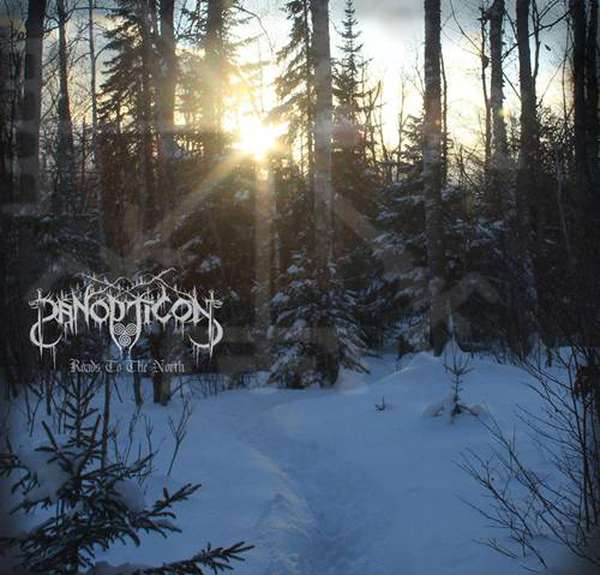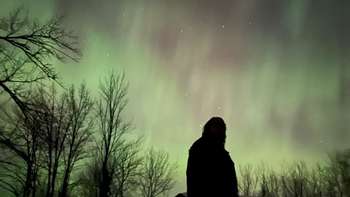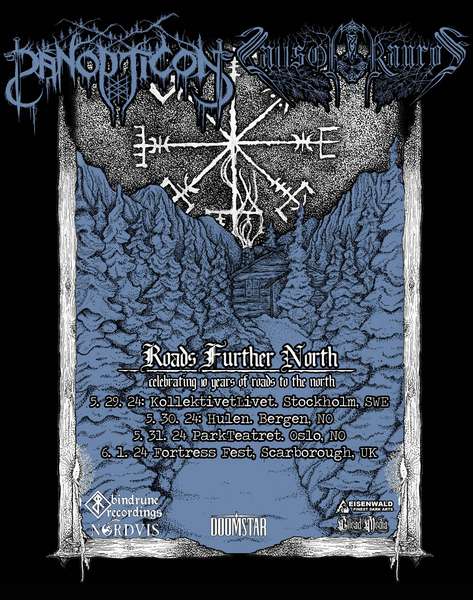Panopticon has been around since 2007, releasing great albums, from their self-titled full-length to the 2012 Kentucky. And it was with Kentucky that the band really made many heads turn. Their folk infused black metal was a breath of fresh air for the scene, with A.Lunn making things more interesting, using unconventional tactics. The only worrying part of all this was that Kentucky would be a very tough act to follow, and the pressure was in and the stakes were high for Roads to the North. But still, Lunn does not disappoint.
In essence Panopticon is a black metal band, and they show it throughout the album with their more aggressive outbreaks. The full effect hits you straight in the album with “The Echoes of a Disharmonic Evensong” sending waves of hate your way. The mean predisposition of Panopticon is obvious and does not hold back for anything. And they can become even more sadistic in some cases, as is the very end of “The Long Road Part 2: Capricious Miles,” and more bitter in other instances, for example about five minutes in “Chase the Grain.”
What I always found to be the most interesting part of Panopticon’s music was how versatile and fluent his guitar work was. From the more straight forward black metal riffs of “The Echoes of a Disharmonic Evensong” to the more rock ‘n’ roll vibe of “Where Mountains Pierce the Sky,” about two minutes in the track, Lunn keeps this album very exciting and manages to glue together parts that at first would seem not to match. And that is just their riffs, because this guy can get quite impressive with his technique as well. Two minutes in the opening song his ability to thrown in crazy leads is insane and, about four minutes in, throws in some sweep picking to make things even more impressive. Things get almost schizoid about five minutes in “Where Mountains Pierce the Sky” and the capacity of Lunn to throw is some solos, as is the case about seven minutes in the opening song, is unbelievable to say the least.
When you combine that with the skillfulness of Lunn to conjure ambiances for his songs, then things get even more fascinating. As much of aggression the opening song comes in with, the switch to more atmospheric passages about four minutes in will really make your head turn, especially with the fantastic inclusion of a violin. And what makes Roads to the North a great album is the variety of different ways of exploring those ambiances. From more straightforward parts, as the acoustic guitar part about three minutes in “Chase the Grain,” to the more dreamlike vibe at the start of “The Long Road Part 3: The Sigh of Summer.” There are even cases when things start to become more experimental, about three minutes in “The Long Road Part 2: Capricious Miles,” bringing forth an almost haunting aura from the band.
But no matter how great all the above can be, Panopticon stand out with their inclusion of folk music. And I am not just talking about some acoustic guitar parts here and there; we are talking about bluegrass parts. “The Long Road Part 1: One Last Fire” comes in with a banjo and really gets into your head. And that is a fucking upbeat, fast track as well. Lunn offers more moments of such influence, with “Norwegian Nights” really standing out for me, with a great clean vocal performance. But Lunn even goes beyond that. “In Silence,” which is one of the black metal tracks, you will find a sudden folk interlude about seven minutes in. Lunn can easily go from black metal to bluegrass and the other way around with such fluid motions. But the extent of the collision between black metal and folk that Lunn can go to really shines in “Chase the Grain.” It is quite hard to believe that these two musical sides co-exist in this piece. It is one of those things that you would never thing that they could be mixed together, but somehow they manage to.
Panopticon is a unique band. I considered Kentucky to be their pinnacle work and that it would be extremely difficult for Lunn to surpass that. Well, what do you know? I guess I was wrong.




